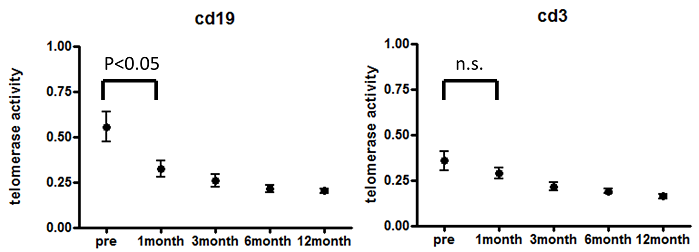Session Information
Date: Tuesday, November 10, 2015
Title: Rheumatoid Arthritis - Small Molecules, Biologics and Gene Therapy Poster III
Session Type: ACR Poster Session C
Session Time: 9:00AM-11:00AM
Background/Purpose:
Telomere is a
component of chromosome, and protects end of chromosome from various stress. Telomere
shortens during cell division, and telomerase maintains telomere length. It was
reported that telomerase activity of lymphocytes is upregulated when the
lymphocytes are activated.
Abatacept
suppress the activation of T lymphocytes which are involved in pathogenesis of
rheumatoid arthritis. Therefore we investigated effect of abatacept on
telomerase activity of lymphocytes of patients with rheumatoid arthritis.
Methods:
This study
included 16 patients who were diagnosed with rheumatoid arthritis based on ACR
2010 criteria and received treatment of abatacept from August 2012 to August
2013. We collected their clinical data and peripheral blood samples before
starting abatacept, 4, 12, 24, and 52 weeks after the treatment. Then we extracted
peripheral blood mononuclear cells using ficoll. And CD3 positive lymphocytes
and CD19 positive lymphocytes were sorted by magnetic beads. Using these cells,
we measured telomerase activity by Telomeric Repeat Amplification Protocol.
Results:
Mean age of
patients was 59.2. Before using abatacept, patients were received various
treatment including prednisolone, conventional disease-modifying anti-rheumatic
drugs and biologic therapy. DAS28-CRP before treatment of abatacept was 3.43,
and that after the treatment was 1.54.
Telomerase
activity of CD3 positive lymphocytes declined from 0.413 to 0.156 (p<0.05)
at 52 weeks after the treatment, and that of CD19 positive lymphocytes also
declined from 0.755 to 0.187 (p<0.05). Telomerase activity of CD19 positive
lymphocytes was significantly downregulated at 4 weeks after the treatment, although
that of CD3 positive lymphocytes was not significantly downregulated. (figure)
Conclusion:
Treatment of
rheumatoid arthritis including abatacept suppressed the activition of T
lymphocytes and B lymphocytes. Telomerase activity of B lymphocytes was
downregulated before that of T lymphocytes. It is suggested that abatacept
directly suppress the activation of B lymphocytes.
To cite this abstract in AMA style:
Otani K, Ito H, Hirai K, Noda K, Yoshida K, Kingetsu I, Kurosaka D. Effect of Abatacept on Telomerase Activity of Lymphocytes of Patients with Rheumatoid Arthritis [abstract]. Arthritis Rheumatol. 2015; 67 (suppl 10). https://acrabstracts.org/abstract/effect-of-abatacept-on-telomerase-activity-of-lymphocytes-of-patients-with-rheumatoid-arthritis/. Accessed .« Back to 2015 ACR/ARHP Annual Meeting
ACR Meeting Abstracts - https://acrabstracts.org/abstract/effect-of-abatacept-on-telomerase-activity-of-lymphocytes-of-patients-with-rheumatoid-arthritis/

